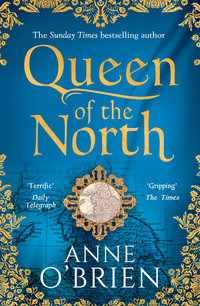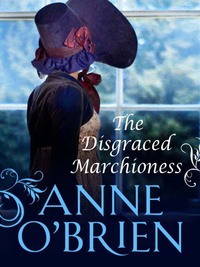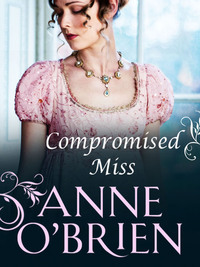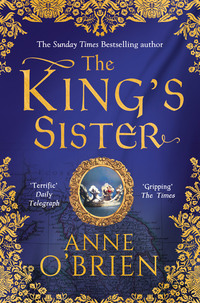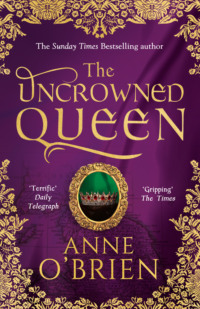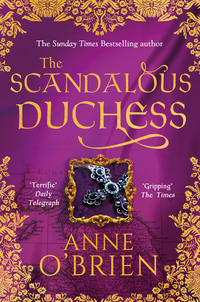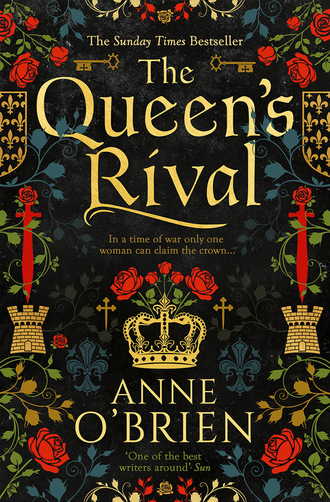
The Queen’s Rival
Cecily continues to pluck her brows with marvellous precision.
I will not suggest to her that to care so much for appearance is the sin of pride.
It might be better if you refuse all correspondence; however, since I cannot prevent it, it must be your decision. I threatened to read every letter myself before allowing it beyond my walls. Cis said she could not believe I would be so petty. Would it not be beneath my dignity to treat a sister with such disdain and lack of trust?
I admit to a wave of guilt. I cannot do it, even when I suspect that same sister of arch dissembling. Marks of sleeplessness and anxiety mar her handsome features, blemishes that I have never seen before.
What I can prevent is any communication between Cecily and our neighbours. The less local gossip the better.
I am in need of a recipe for a dish of eels I think you might recall, one that our mother enjoyed. My cook is unable to produce anything edible. I would be grateful if you would send any recipe you have.
Your sister,
Anne
Katherine, Dowager Duchess of Norfolk, to Cecily, once Duchess of York
Written from Epworth
My dear Cis,
How should I address you? Dame Cecily?
Reading between Anne’s caustic lines, it seems that I am chosen by you to be a conduit for treasonable communication. Have I read it correctly? I doubt you would need my counsel. Even if I gave it, you would probably ignore it.
Should I agree to be part of your conspiracy? Anne has warned me off any attempt to help you reach out to York or our family in Calais. Did you know they are all safe? Our brother and nephew and of course Ned slipped happily into Calais through an unguarded postern gate, where, as Captain of Calais, Warwick was made very welcome. Richard and Edmund are now safe in Dublin.
Beaumont is furious that the Queen’s party cannot get their hands on them. I have commiserated with him, of course. He makes no concession that it is my brother he is condemning. Beaumont is a man without sensitivity.
I await your letters with eager anticipation, even if I have still not decided what I will do about them. My husband would deny me the freedom to comply with any of your wishes. How exciting! How tempting! I rarely refuse an opportunity to put a spoke in Beaumont’s wheel. His stand against the House of York at Coventry was deplorably self-interested. But then, are we not all so motivated?
Not least you, Cis.
Please pass the enclosed to Anne. She was desirous of receiving it. I do not recall eating it with any pleasure, but then I am not fond of eels. Nor can I recall our mother the Countess of Westmorland ever being ecstatic when they appeared on the table during Lent.
Anne says that your face is acquiring the prints of old age and worry. I don’t believe her, but try a daily decoction of ground lily-root mixed with egg and vinegar to hold the ravages at bay. Let me know if it is efficacious. I may make use of it.
Your loving sister,
Katherine

A Recipe of Joan, Countess of Westmorland, for Eels in Gauncelye (Garlic Sauce)
Take eels and skin them and simmer them in water with a little salt.
Take scalded bread, grind it and add it to the broth with a measure of ale.
Take pepper and ginger and saffron and grind together.
Boil onions and parsley together.
Mix altogether and serve it forth.

Do not expect much enjoyment from this. I eat it as infrequently as I can.
Chapter Six

A Soft Imprisonment
Duchess Cecily’s intercession to the Blessed Virgin Mary
Hail Mary, full of Grace, Our Lord is with thee.
Blessed Virgin, I kneel in utmost gratitude. They are safe. All of them. Alive and far from retribution. I bend my head in thanks. I weep at your feet.
Holy Mother, sustain them.
Do I fear or rejoice? I know they will not be content to remain in exile.
Grant me the patience to live with my sister without recourse to temper when she lectures me on my refusal to see the good qualities in our Beaufort cousin, the Duke of Somerset.
Grant me tolerance of my sister’s priest who is a dyed-in-thewool Lancastrian.
Grant me the imagination to be crafty-clever in my gleaning of information.
Grant me the fortitude to eat my sister Kat’s recipe for eels in gauncelye.
Grant me acceptance of the marks of time and anxiety, in spite of my liberal use of Kat’s ill-smelling remedy. Forgive the vanity of a woman who dares no longer glance in her looking-glass.
Amen
Cecily, Duchess of York, to her daughter Anne, Duchess of Exeter
Written from Tonbridge Castle
To my dear Anne,
I am allowed to write to you, through the kind permission of your aunt Buckingham (although I begrudge her the right to give me such permission), since Exeter is well known to be hand in glove with the House of Lancaster. There is no hope of aid for York in your household.
What should I write to you, my daughter? Be brave. There is no blame on you for Exeter’s deeds. Nor can his commission of array have any effect on those we love. They are all safe, beyond the sea.
Pray for your father and brothers. There is no need for Exeter to know what is said between you and the Blessed Virgin. As your mother I absolve you from total obedience to him. He is a fool and a treacherous one at that. If you should find a need for consolation outside marriage, I cannot blame you. All I would say is, be discreet.
You may consider this to be strange and sinful advice from a mother to her daughter, but life can be very long and lonely without affection in it.
Your loving mother,
Cecily, Duchess of York
You will notice that I retain my title. In my own mind, with my own pen, I refute the right of Queen Marguerite’s law to remove it from me.
Cecily, Duchess of York, to Katherine, Dowager Duchess of Norfolk
Written from Tonbridge Castle, January 1460
My dearest sister,
You may continue to address me as Duchess of York, if you were under any misunderstanding of the situation.
I enclose a letter. Can you see your way to delivering it to Dublin? And to sending his reply to me, when he writes one, with a covering letter? I know that it may tip you into a confrontation with your husband, but I think you will not greatly care. I doubt that Beaumont reads the letters that you receive. Tell him that it is a dispute over rents and he’ll gladly assign it to you.
You might even enjoy playing him as a cat plays with a mouse. Although he is a most important mouse, as he will never allow us to forget.
Here’s the situation at Tonbridge, enough to drive any woman of intelligence and ambition to tearing her veils. All those great towers connected by a formidable structure of high curtain walls. I feel as enclosed as a hen being fattened in a coop before the Christmas festivities.
Life here is as dull as your taste in antique houppelandes. I am superfluous; the events of the castle flow smoothly around me, like a fast-flowing river around a small stone in its path. I am not necessary. Even where I see possibilities for improvement and itch to apply my fingers to the issue, it is not my problem to alleviate. All I can do is keep my own counsel and wonder that Anne should not take better care of her household. I suspect that her Steward has his busy fingers in the ducal coffers. Anne spends far too much time with a book in her hands. This week it is Legenda Sanctorum, Jacobus de Varagine’s lives of the saints. I have not noticed any increased saintliness in her approach to my predicament.
Diccon and George are given into the keeping of the priest and the sergeant at arms to practise with pen and sword. I think young Henry, Anne’s grandson, enjoys their company. Meg spends time with Anne’s books and the experienced mistress of the still room. Anne is intent on destroying my influence over them in case I turn them into traitors.
For me, my life is bound around and narrowed to the female pursuits of reading, stitching altar cloths and lute playing. The chains, although invisible, are securely in place. My only freedom is in my prayers. Anne will never know the fervency of my pleas for my husband and sons. Will they ever be able to return?
Even my freedom to walk is restricted to the wall-walk and Anne’s small garden within the castle, a pleasant plot that has no need of my care. Anne employs servants to prune and plant and gather. All I can do is look out over the crenellations to the south, to the west, hoping for good news. Yet I know that to hear of their return could be the worst possible happening. To return could well mean death.
We celebrated the Feast of the Birth of the Christ Child, swiftly followed by the New Year, but there was no celebration in my heart. So much hostility simmering beneath the false mirth of the mummers and minstrels. It was not a happy time. What would we be without our marriages, Kat? Would we still be the same sisters who enjoyed each other’s company, who played and sang and rejoiced together at New Year as children, although you were so much older than I? Not one of us Nevilles chose the husband we would wed. We must live with the life we were assigned by our ambitious parents.
I am desolate, Kat.
Do write to me, even if you have nothing to send me from Richard. I need your encouragement in this house of rancour. You would be astonished at how polite and amenable I am become.
Your loving sister,
Cis
Do send a different recipe for the preparation of eels. Anything to give Anne’s cook an idea beyond the use of Lenten fare. What about something to enliven carp? Anne’s fishponds have a surfeit of them.
Cecily, Duchess of York, to Richard, Duke of York, by the hand of Katherine, Dowager Duchess of Norfolk
Written from Tonbridge Castle
My most well-beloved Richard,
How difficult it is to begin this letter.
So much to say – the words clamour in my mind and in my heart – but so little to say of value. I am a prisoner at Tonbridge Castle under my sister Anne’s aegis. I expect that you can imagine the strained atmosphere. Humphrey is away from home so not available to keep the peace between us with his good sense.
You are safe in Dublin, I know. You are alive. There had always been that fear that your ship had foundered in the waters off Ireland. Better days will surely come when you return to England. I anticipate it with a fervour that you cannot imagine.
As you see, I have already circumvented the curtailment imposed by Anne with the aid of Katherine. I have arranged that through my letters to her – with royal permission due to Beaumont’s excellence in licking the royal boots – I will write to you, and you can return them using the same route. A convoluted arrangement but the best I can do. Katherine has decided that she will enjoy thwarting her husband.
Here is what you should know, my dear Richard, if it has not reached you by other means. Following hard on the attainder, our lands have been split and apportioned to friends of the King. We are truly landless. Exeter has got Fotheringhay in his tight fist. All those who have danced attendance on Henry have been rewarded with gifts of great value.
Thus by a stroke of a pen you have been stripped of land, title, power, and made a penniless outlaw. It is too vast to contemplate. Every title, every castle, every piece of land that you owned, all part of your proud inheritance, all gone.
You would not believe the accusations made against you at Coventry. All Marguerite’s doing. She sees you as her most bitter enemy, believing that your whole life has been spent in wretched manoeuvrings to take the throne from Henry. She will blacken your name beyond salvation.
I cannot bear to contemplate the destruction of your heritage and the inheritance of our sons. You, I trust, will be more stalwart. Meanwhile, I am learning to guard my tongue for the first time in my life.
Living at Tonbridge, despite all the comfort, drives home for me just what it is that I have lost. Not to any casual observer, of course. If such an unbiased creature existed in this turbulent time, they would say that I am leniently served in the light of my family’s clear-cut treason. I might be dispossessed of lands and title, but I am still Duchess of York to my sister’s household, treated with every respect. I am not penniless and my sister, with the air of a martyr, is unstinting in her physical care of me and my children.
But that is merely the pretty pattern of shadows on the surface of the pool. Below it is a maelstrom of great loss. Anne’s household might be respectful but only within what I might ask or require.
Beyond that I am closely guarded, with a subtlety that sets my teeth on edge. It is rare that there is no guard to accompany me whenever I step beyond my chamber or the solar. What if I order a horse and an escort to ride into freedom beyond the gates? Will they be so accommodating? They would refuse me. I am forbidden to receive private visitors. Marguerite fears that if I am allowed freedom I will work to bring your return. Of course she knows me well. I will do it, if and when I can. You know that your reinstatement at the King’s side occupies my thoughts every day.
Tell Edmund that I think of him. Ensure that he continues to apply himself to his reading and writing. Perhaps you should find him a tutor. He will neglect such skills if you do not watch him. Here at Tonbridge Meg continues to be a solemn witness of events in this world. George is noisy and Richard contemplative. They are children of whom you should be proud. Did I not instil them with honour and pride and a duty to the noble cause of York, that terrible day in Ludlow? I swear that their royal blood will shine through whatever trials we are called upon to face.
I have told Anne that I am considering repentance, of making a confession of my sins. She does not believe me.
Here I make my oath, my dear love.
I will never turn from you. I will never abandon what we have worked for. Our love will last for all time. I pray for your safekeeping and your swift return when affairs are more stable. Commissions of array have been given, to prevent any further rebellion by you or your allies. I doubt you will be surprised that our son by marriage, the diabolical Exeter, is one of those so blessed.
You know my love for you. I cannot write it here.
I would ask you to rescue me, but I know that I must withstand the storms and torrents of our ill fortune. When will you find the need to write to me, to tell me of how you go on? By the Blessed Virgin, Richard. Surely you can employ a clerk if your energies are demanded elsewhere. Do you not have a dozen scribes at your command? I dislike being encumbered by this abhorrent silence.
Your most loving wife,
Cecily
Richard, Duke of York, to Cecily, Duchess of York
Written from Dublin Castle
My most-beloved wife,
I read your anger between the words – indeed you have not exactly made an attempt to mask it, which tells me that you are still in good heart and very much the woman I admire. I acknowledge my fault in this, that I have been lax in sending word to you. It has been too dangerous to commit my plans to pen and ink. I accept your reprimand. It is good to know that you have retained your spirit despite the attack on your dignity and your skirmishes with your sister. It means everything to me when the world I knew is shaking on its foundations.
I have little news for you, except that we are alive and safe in Dublin where I am made most welcome as Lord Lieutenant. It is a relief not to have every action and thought picked over for hidden motives. The Irish will never hand me over to the enemy. It is my intention to summon a parliament in Dublin in early February. I am promised that if we work together to allow Ireland autonomy from England, I will receive finance, protection and an army of archers. All I could hope for. My allies from the days when we lived here have proved most generous and accommodating.
I know it will be high in your mind, but I must not yet speak of the future. Nothing is written clearly, nor would I wish for any plans to fall into the wrong hands. I accept your advice and agree that all is not advantageous for my return. I must rely on your patience and good sense to keep your faith strong. Our history, my dearest Cis, is not yet complete. One day we will be together again. One day our inheritance will be returned to us, I swear it.
I cannot write what is in my heart, but I know that I do not need to do so. You are aware of all I am, all I have ever been, and all I hope to be.
Hoping this reaches you safely through Katherine’s kindness. When secrecy no longer matters, I will write more.
You may take satisfaction from the castle here in Dublin being as inconvenient and draughty as it was when we were in residence. The walls still drip with damp and every wooden panel grows its own species of mould. It will be my punishment, while you are in luxury in Tonbridge.
Your most loving husband, in spite of all appearances to the contrary,
Richard
Edmund, Earl of Rutland, to Cecily, Duchess of York
Written from Dublin Castle
To my most revered Mother,
My father says that I must write and tell you how I spend my days, to set your mind at ease. I am in good health now that we are settled in Dublin. I did not enjoy the sea crossing.
It will please you to know that I have at last been installed as Chancellor of Ireland, a position that has been mine since I was eight years old.
Do not expect me to write too often. The hunting here is very good, with fast runs after the deer. I have received a gift of my own wolfhound, called Cuchulain after the Hound of Ulster, the proud Irish hero. I have read about him. I do not have time for much reading.
I do not know when we will return to England.
Your affectionate and obedient son,
Edmund
Cecily, Duchess of York, to Katherine, Dowager Duchess of Norfolk
Written from Tonbridge Castle
My dear Kat,
Here you have a letter from an aggrieved wife.
I am not sure what I expected from Richard. A plan of action? A letter expressing his undying love? Even the briefest comment to relieve my concerns over his good health? I received none of those. I know no more than before his letter arrived. For all the personal touches it could have been written by his clerk. I would say it had been, if it were not for Richard’s instantly recognisable scrawl.
Richard seems comfortable taking up the reins of Lieutenant. Edmund has been confirmed as Chancellor. Shall I say what worries me? That my husband might be tempted to remain there and carve out a new realm for himself. Do you suppose that he sees himself as King of Ireland?
Meanwhile, I live in hope of better things. The temperature here is as cold inside as it is out. My sister Anne has handed the Legenda Sanctorum to me. She has taken up a French translation of Lucan’s epic poem Bellum Civile. In the circumstances I would much rather enjoy the warlike exploits of Julius Caesar and Pompey than the endless prosing of saints but Anne thinks Caesar and Pompey unsuitable for calming my mind.
My embroidery is improving, Anne tells me.
Diccon wishes to write to Edmund, so I have included this. George has no inclination to write to anyone. Please send it on when you are next in communication.
What is Beaumont doing? Still working hard to remain a recipient of Queen Marguerite’s smiles?
To do justice to Richard, he left me in no doubt of his affections, and his desire to be reunited with me. It’s just that I cannot see when it can ever happen.
Your affectionate but thwarted sister,
Cecily
Richard, youngest son of the Duke of York, to Edmund, Earl of Rutland
Written from Tonbridge Castle
Brother!
I wish I were there in Dublin with you. We are at Tonbridge Castle which is all very well but we are kept closely confined.
I would like a wolfhound. Could you send me one? I don’t suppose that would be possible.
If I cannot be with you in Dublin, I would wish to be with our cousin of Warwick. His fleet is raiding along the south coast of England, stealing ships and ravaging towns. It sounds like a pirate’s life and very exciting.
Our Lady Mother has helped me to write this. She says that my hand with a pen is lamentable. She hopes I will be better with a sword.
Your envious brother,
Diccon
Anne, Duchess of Buckingham, to her sister Katherine, Dowager Duchess of Norfolk
Written from Tonbridge Castle
Sister,
I mislike that Cecily writes to you so frequently. I do not approve of the tally of correspondence and I have threatened to read the contents. Cecily challenged me to do it, but I could not, in the face of her utter disgust.
I could shake Cecily! Does she not realise that York’s bid for power is well and truly dead? Her temper grows shorter by the day.
By the by. Do you have our mother’s remedy for the ague? I am suffering.
Your affectionate sister,
Anne
Katherine, Dowager Duchess of Norfolk, to her sister Anne, Duchess of Buckingham
Written from Folkingham Castle
Sister,
Do you accuse me of deceit? Of collaboration with my sister for the good of the Yorkist cause? Save your ink and your parchment. We agreed that I would not encourage Cecily in her passions. I have not done so. If she wishes to write to me because she finds me a more sympathetic ear than any to be found in Tonbridge Castle, then that is entirely your own doing.
In God’s name, give Cecily something cheerful to read. Something that is not sermons and saintly encouragement. The never-ending virtues of the Saints can be quite overpowering, not to say lowering to the spirits. And something other than in Latin. It was never her strong point. She is very anxious, as you would be if you lost your husband. She worries that Richard might not return. Cecily will soon come round to the reality of life.
I have no remedy against the ague. Our mother never suffered an ague in her life. With ten children to raise to adulthood she had no time for agues. Neither have I suffered such an inconvenience.
As always, your affectionate and always honourable sister.
I still resent your accusations.
Katherine
Cecily says that you are in need of a method of making carp interesting. My cook says to try this. Substitute carp for tench if you have a taste for it. It is not one of my favourite recipes.

A Recipe of Joan, Countess of Westmorland, for Tench in Sauce


